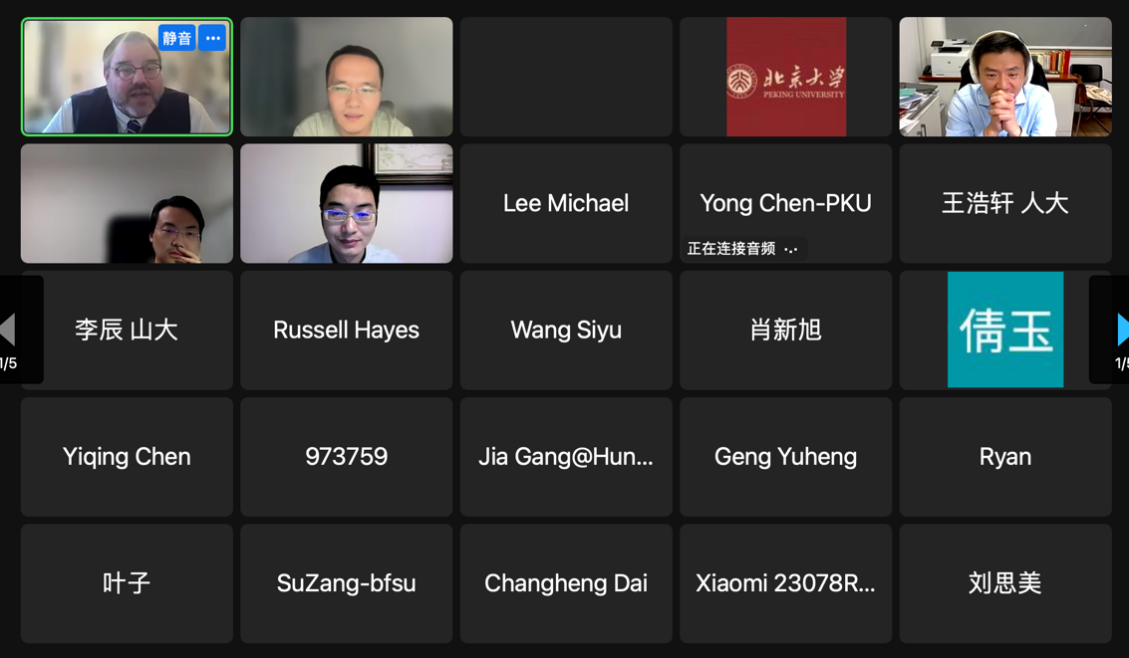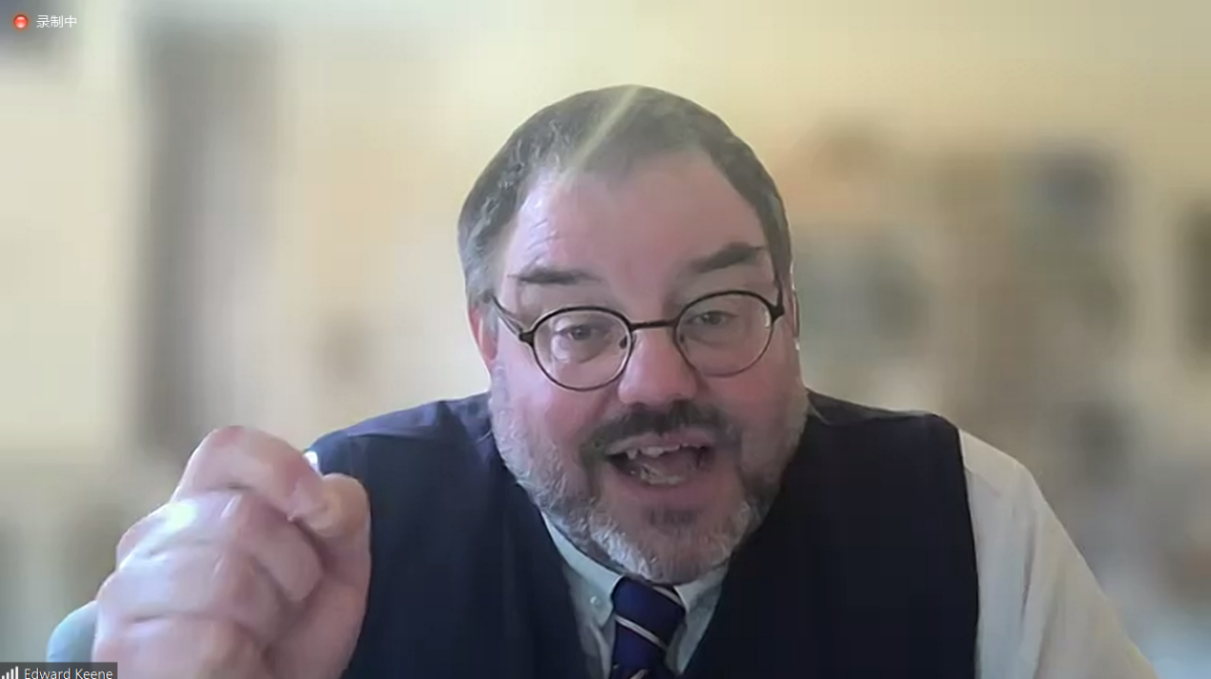
On November 22, 2023, the Institute of Area Studies, Peking University (PKUIAS) held the 13th lecture in its “Adventus Amicorum” series online. The keynote speaker was Edward Keene, an associate professor at Oxford University's School of Politics and International Relations, and his topic was “Who's who in international relations? The vocabulary for describing international actors.” Kong Yuan, an associate research fellow of the Institute of European Studies, Chinese Academy of Social Sciences, served as the moderator of the seminar. Yin Zhiguang, professor at the School of International Relations and Public Affairs of Fudan University; Chen Yifeng, associate professor at the School of International Relations and Public Affairs of Peking University; Chen Yudan, associate professor at the School of International Relations and Public Affairs of Fudan University; Zhang Biao, associate professor at the School of Politics and Public Administration of China University of Political Science and Law; and a number of postdoctoral fellows from various departments of the university participated in the discussion.
Keene identified the two segments of his talk, the first being a review of the themes of the recently published Chinese translation of his edited book International Political Thought: A Historical Introduction, followed by an introduction to his recent research work.
In the first part of the lecture, Keene gave an in-depth analysis of the structure and content of International Political Thought: A Historical Introduction. He noted that the book was written for undergraduates to understand international political thought and that it contained three key goals. Per Keene, one goal was to introduce a specific methodological perspective. This perspective considers the history of international political thought from a range of linguistic and linguistic contexts, seeking to understand the linguistic features of how people talk about international relations. The second goal was to explain the difference in the linguistic construction of international political thought by different groups. Keene said he sought to broaden the conversation about international politics beyond the territorial boundaries of sovereign states to consider the different ways in which the international order was configured at a fundamental level. The third goal was to introduce the three key concepts of international political theory — nature, culture and civilization, and explain why they are so important to understanding international politics.

Keene then went on to explore each of these themes in turn. As he explained, the first was the linguistic approach. He adjusted the traditions of realism, rationalism and revolutionism, which are classified by Martin Wight’s three ideological traditions, and emphasized the core concepts of international relations, the changes in connotation and the background of the period. He argued that language played an important role in how humans produce meaning, a key dimension of the social and political world. The emphasis on language reshaped the nature of political order itself, because the nature of that order was ultimately based on the language that people use. The second was the diversity of language construction, which Keene said he wanted to draw attention to because different languages were not all engaged in some big, eternal conversation — such as the perennial question of war and peace in international politics. There were real differences and discontinuities between different languages, he said. He further pointed out that differences between languages could be used to illuminate contrasts and discontinuities in the world order, and that no eternal logic always applied to international relations. Finally, Keene discussed the vocabulary people used to talk about international relations and the linguistic context behind it. Three key concepts—“nature,” “culture” and “civilization” — kept cropping up in every language that talks about international politics, he said.
Per Prof. Keene, among them, “nature” tended to have a universal quality and pointed to the essential identity of different societies. “Culture,” by contrast, was specific and pluralistic, telling the history of a particular group of people and the ways in which they developed certain practices for themselves. “Civilization” had a very close dynamic relationship with the former two, located between “nature” and “culture.” “Civilization” was artificially created, it was more developmental, and it also enabled dynamic interaction between different cultures — rather than simply tolerating differences. “Nature,” “culture” and “civilization” were a trinity, and the book also contrasted the understanding of the three in different languages and specific words, he said.
Keene expressed his belief that the book was an attempt to study the history of international political thought using a linguistic approach, and was a reflection on the nature of political communities and various types of international order. He pointed out that understanding how “nature”, “culture” and “civilization” were formed in different languages was crucial to understanding how people thought about international politics in the past and how different types of international order were constructed. Keene finally pointed out that the two projects he was currently researching were the evolution of the concept of “great powers” and the stratification of international relations, and trying to break through the theory of international relations that preset equality, focusing on the adjustment of the international situation caused by the strength differences between large and small countries, and emphasizing the importance of hierarchical factors.
During the discussion session, the teachers and students attending the seminar had an in-depth exchange and discussion with Keene about the content of his lecture.
Yin Zhiguang had an in-depth discussion with Keene on the importance of historical methods, linguistic methods in understanding world order, cultural diversity and Occidental criticism. Chen Yudan discussed the possibility of introducing new ideas and new methods in the field of international thought history, in addition to the “Cambridge School” represented by Quentin Skinner, and proposed that the study of international relations could be extended to the fields of image and music. Zhang Biao discussed with Keene the revival of thought and the study of international hierarchy represented by David Lake from the perspective of international relations. Keene responded positively to each of the discussions and answered a series of questions from the audience.


